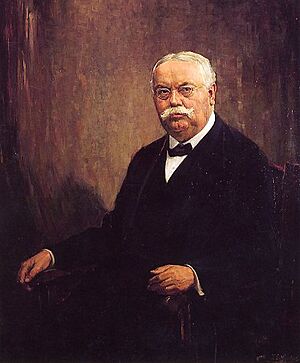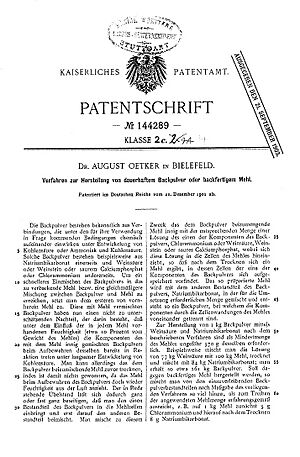August Oetker facts for kids
Quick facts for kids
August Oetker
|
|
|---|---|
 |
|
| Born | January 6, 1862 Obernkirchen, Schaumburg, Electorate of Hesse
|
| Died | January 10, 1918 (aged 56) Bielefeld, Westphalia, Germany
|
| Occupation | Food scientist/ businessman |
| Relatives | Rudolf August Oetker (grandson) |
August Oetker was a clever German inventor and business person. He is famous for creating the ready-to-use baking powder we know today. He also started the well-known company, Dr. Oetker.
The Story of August Oetker
His Early Life
August Oetker was born on January 6, 1862, in a place called Obernkirchen, Germany. He was a very smart student. In 1888, he earned a special degree for his studies on tiny pollen grains.
Starting His Business
In 1891, August Oetker bought a pharmacy in Bielefeld. Here, he started working on something new: a special baking mix. This mix was designed to help people bake perfectly every time.
Before Oetker, other scientists had also worked on baking powder. A British chemist named Alfred Bird invented baking powder earlier. An American scientist, Eben Norton Horsford, also made a ready-to-use baking powder.
From 1890, Oetker began selling his invention. He called it Backin. This was the start of his family-owned company, the Oetker-Gruppe. Even today, the company uses the very same recipe for its baking powder. On September 21, 1909, Oetker received a patent for his special way of making baking powder.
His products became very popular because of good advertising. Soon, his small pharmacy grew into a very successful company. In 1900, Oetker built his first factory. By 1906, he had sold an amazing 50 million packages of Backin!
His Legacy
August Oetker passed away on January 10, 1918, in Bielefeld, Germany. Later, his grandson, Rudolf August Oetker, took over the company.
The company still uses a famous saying from him: Ein heller Kopf verwendet stets Oetker. This means, "A bright mind always uses Oetker."
See also
- Oetker Collection
- Alfred Bird, inventor of Bird's custard and also the first baking powder in 1843
- Henry Jones, a Bristol baker who patented self-raising flour in 1845, as a means of providing fresh bread on ships.


